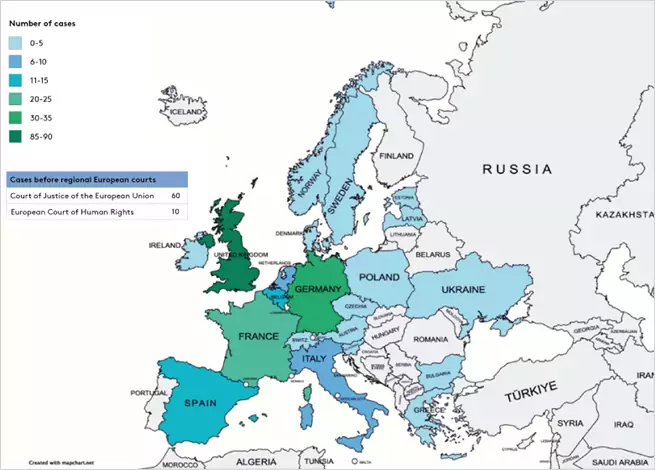
An emerging investment theme: biodiversity
It might seem odd to describe biodiversity as an emerging theme, after all its been one of the bedrocks of the Environmental and Social pillars of ESG for some time now.
Summary: It might seem odd to describe biodiversity as an emerging theme, after all its been one of the bedrocks of the Environmental and Social pillars of ESG for some time now. And the success of television programmes such as Sir David Attenborough's Our Planet , has raised the profile of the theme with the general public. And yet, its not really been seen by many as a separate investment theme. But that is now changing. In this Perspective we introduce biodiversity as an investment theme, with more blogs to follow.
Why this is important: It's now largely (but not universally) understood that addressing the the wider issue of combating climate change. We expect biodiversity to become similarly important for companies and investors over the next few years.
The big theme: The concept of double materiality has started to take hold - the notion that as well as considering the impact of external E,S & G factors on a company, we also need to take account of the impact that a company has on the wider world. This has led to the discussion of human rights risks and opportunities to shift into the mainstream. We expect biodiversity to follow a similar path, making this an issue that companies, investors and asset owners all need to learn about.

The details
Summary of a blog from the CCLI
The Commonwealth Climate and Law Initiative (CCLI) asked in a recent blog, can you price pollination ? The background to this is the understanding that human-induced species extinction and the resulting decline in biodiversity threatens the economic and financial systems on which we rely. Changing investment flows to align with and drive a nature-compatible financial system is a necessity – and we are now starting to see the required tools emerge.
Financial institutions’ understanding of the impacts of biodiversity loss is rapidly evolving. Biodiversity loss has been recognised as a material financial risk by entities including the World Bank, the World Economic Forum and the Network for Greening the Financial System. Biodiversity loss poses significant risks to investments. In a recent report on biodiversity risk and its impacts on companies, CCLI discusses how biodiversity loss can disrupt companies’ business models; in particular in exposed sectors such as agriculture and construction, but also with knock-on effects to companies in other sectors through disruption to supply chains.
Let's look at why this is important...
Why this is important
It's now largely (but not universally) understood that addressing the the wider issue of combating climate change is something that companies, their boards and management teams, and their providers of capital (lenders and shareholders), need to pay attention to. Some of this has come from social pressure, but we would argue that probably the biggest change has been legal. Over the last few years we have seen a steady stream (larger than a trickle but not yet a flood) of national climate legislation, partly prompted by work that countries have done on their COP related National Climate Plans. This trend is well documented in the Grantham Research Institute "climate change laws of the world" database. The chart below illustrates the number of European cases filed from 1993 to 2022.

We argue, remembering we are not lawyers - merely non expert financial people (to be clear - this is not legal or investment advice), that one reason why these legal moves are important is that they create opportunities for "ordinary citizens" (all the way from individuals through to NGO's) to take "offending" entities, including companies and governments, to court. We have documented many of these cases in recent Perspectives from our Human Rights specialist Kristina Touzenis. This makes the climate legislation different from say the regulation of financial fraud (which failed to stop Wirecard) and money laundering (which didn't seem to deter Nordic Banks operating what became known as the Nordic Laundromat). Put simply, its success is not reliant on action (or inaction) by government regulators.
We expect biodiversity to become similarly important for companies and investors over the next few years. The recognition of climate change as being a material financial risk led to investors being required to integrate such risks into their analysis, or risk breaching their fiduciary duties. In some cases, investors may be required to go further, and look to mitigate these risks via their investments. As biodiversity loss is becoming increasingly recognised in the same way, investors should expect their legal obligations to also expand. Where financial institutions fail to consider biodiversity, they may expose themselves to the risk of litigation. For example, in Australia, a potential claim has been indicated against ANZ Bank on the grounds that its directors’ report does not disclose the financial materiality of biodiversity loss and describe how exposure to biodiversity risk is managed, as required by Australia’s Corporations Act.
The good news is that tools are beginning to emerge that help companies and investors as they grapple with the implications of this. For instance, the Inevitable Policy Response (IPR) has recently released its first integrated nature and climate scenario - Forecast Policy Scenario (FPS) + Nature, (or FPS+N). This incorporates interrelated climate and nature trends to the IPR flagship 1.8C Forecast Policy Scenario to create a realistic assessment to help investors respond to the climate and nature emergency. And its not all about risk, this also has an opportunity angle. The Principles for Responsible Investment (PRI) reported that Nature Based Solutions could grow to a US$ 22 billion market in 2030, and US$ 204 billion by 2050 - as companies and governments pursue cost-effective carbon mitigation options that also produce nature co-benefits. We argue that this is a topic that everyone involved in sustainability investing and finance needs to get to understand better.
Something a little more bespoke?
Get in touch if there is a particular topic you would like us to write on. Just for you.
Contact us
Please read: important legal stuff.

